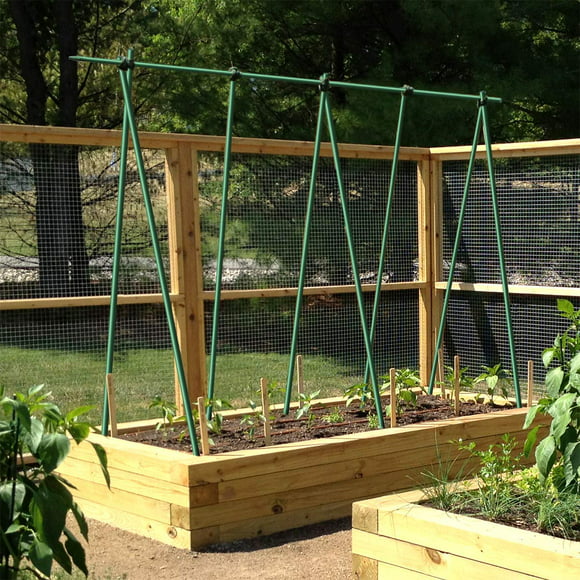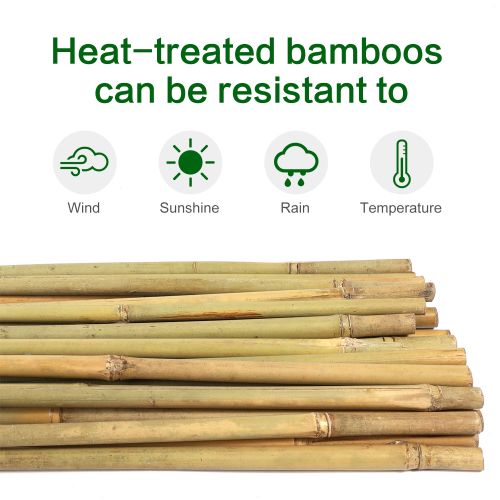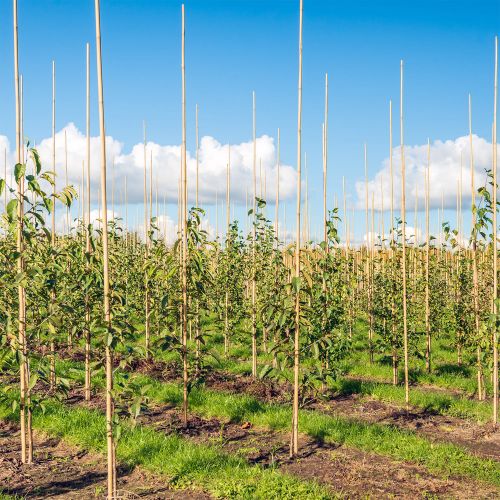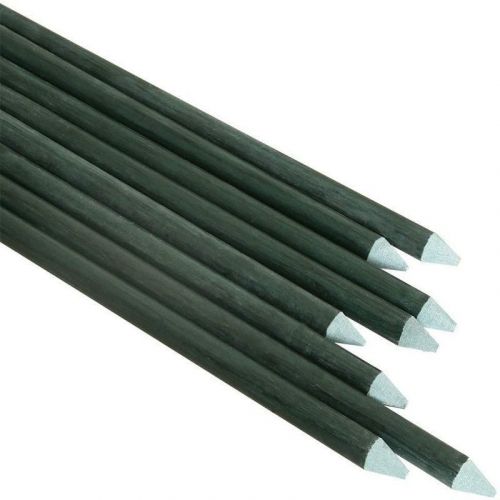Fiberglass Plant Stakes vs. Bamboo: Which One is Better for Your Plants?
Plants require adequate support to grow healthy and strong. When it comes to providing support to your plants, plant stakes are an excellent solution. However, choosing the right type of plant stakes can be a dilemma. Two popular options available in the market are fiberglass plant stakes and bamboo stakes. In this article, Wellcowholesale will compare these two types of stakes and determine which one is better for your plants.

1. Introduction
Plant stakes play a crucial role in supporting plants and preventing them from drooping or bending under the weight of their foliage. They provide stability and help plants grow upright, ensuring proper exposure to sunlight and air circulation. Fiberglass plant stakes and bamboo stakes are both popular choices among gardeners, but they differ in various aspects. Let's explore the characteristics of each stake type to determine which one is better suited for your plants.
2. Understanding Fiberglass Plant Stakes
Fiberglass plant stakes are made from a combination of fiberglass and resin. They are known for their strength and durability. These stakes are manufactured to withstand harsh weather conditions, such as strong winds and heavy rainfall. Fiberglass stakes are available in various lengths and thicknesses, making them suitable for different plant sizes and types.
3. Exploring Bamboo Stakes
Bamboo stakes, on the other hand, are crafted from natural bamboo shoots. Bamboo is a sustainable and renewable resource, making it an environmentally-friendly choice. Bamboo stakes are lightweight, easy to handle, and aesthetically pleasing. They come in different diameters and lengths to accommodate various plant needs.
4. Strength and Durability
In terms of strength and durability, fiberglass stakes have an edge over bamboo stakes. Fiberglass is a highly resilient material that can withstand bending, breaking, or warping. It offers reliable support to plants, especially larger ones or those with heavy foliage. Bamboo stakes, although sturdy, may not be as resilient as fiberglass stakes and may require replacement more frequently.
5. Flexibility and Versatility
Fiberglass stakes offer excellent flexibility, allowing them to adapt to the growth of plants without causing damage. They can be easily adjusted or bent to accommodate plant growth in different directions. Bamboo stakes, while relatively flexible, may not provide the same level of adaptability as fiberglass stakes.
6. Maintenance and Longevity
When it comes to maintenance and longevity, fiberglass stakes have an advantage. They require minimal maintenance, as they are resistant to rot, insects, and weather damage. Fiberglass stakes can last for several years without losing their structural integrity. On the other hand, bamboo stakes may require periodic treatment or replacement due to their natural susceptibility to rot and decay.
7. Environmental Impact
If you prioritize eco-friendliness, bamboo stakes are an excellent choice. Bamboo is a renewable resource that grows rapidly and requires minimal energy to produce. Choosing bamboo stakes helps reduce the demand for non-renewable materials. Fiberglass stakes, although durable, are made from synthetic materials and do not offer the same level of sustainability as bamboo.
8. Cost Considerations
In terms of cost, fiberglass stakes are generally more expensive than bamboo stakes. However, considering their longevity and durability, fiberglass stakes can provide better long-term value for your investment. Bamboo stakes, being a natural material, are more budget-friendly initially but may require more frequent replacement, leading to additional costs over time.
9. Aesthetics and Natural Appeal
Bamboo stakes offer a natural and aesthetically pleasing look to your garden. They blend well with the surrounding plants and create a harmonious environment. Fiberglass stakes, although durable, may not provide the same natural appeal and can be more noticeable in the garden landscape.
10. Ease of Use
Both fiberglass and bamboo stakes are relatively easy to use. They can be inserted into the soil near the plant, providing immediate support. However, fiberglass stakes, with their lightweight and sturdy design, can be easier to handle and position accurately. Bamboo stakes, while lightweight, may require more effort to drive into the ground due to their natural density.
11. Resistance to Rot and Decay
Fiberglass stakes are highly resistant to rot, decay, and insect damage. They can withstand prolonged exposure to moisture without compromising their structural integrity. Bamboo stakes, although treated to enhance their resistance, may eventually succumb to rot or decay, especially when exposed to damp or humid conditions for an extended period.
12. Application and Plant Types
Both fiberglass and bamboo stakes are suitable for supporting a wide range of plant types. Fiberglass stakes excel in providing support to larger plants, shrubs, or trees with substantial weight. They are ideal for long-term plant growth. Bamboo stakes are well-suited for smaller plants, delicate flowers, or indoor potted plants, where aesthetics and natural appeal are desired.
13. Comparing the Pros and Cons
After considering the various factors, let's summarize the pros and cons of fiberglass plant stakes and bamboo stakes:
Fiberglass Plant Stakes
Pros:
- High strength and durability
- Excellent flexibility and adaptability
- Minimal maintenance and longevity
- Resistant to rot, insects, and weather damage
Cons:
- Higher initial cost
- Less natural appeal in the garden landscape
Bamboo Stakes
Pros:
- Sustainable and renewable material
- Lightweight and aesthetically pleasing
- Budget-friendly option initially
Cons:
- Lower strength and durability compared to fiberglass stakes
- Susceptible to rot, decay, and insect damage
14. Conclusion
Choosing between fiberglass plant stakes and bamboo stakes depends on your specific needs and preferences. Fiberglass stakes offer superior strength, durability, and flexibility, making them ideal for larger plants and long-term support. Bamboo stakes, on the other hand, provide a sustainable and aesthetically pleasing option for smaller plants and indoor gardens. Consider the characteristics outlined in this article to make an informed decision based on your plants' requirements, budget, and environmental concerns.
15. FAQs
Q1: Can fiberglass plant stakes be used for all plant types? A: Yes, fiberglass stakes are suitable for a wide range of plant types, including larger plants, shrubs, and trees.
Q2: Do bamboo stakes require any special treatment before use? A: Bamboo stakes are generally treated to enhance their resistance to rot and decay. However, it's advisable to check the product specifications or consult with the manufacturer for specific instructions.
Q3: Can fiberglass stakes be recycled? A: Fiberglass is not easily recyclable due to its synthetic composition. Proper disposal methods should be followed according to local regulations.
Q4: Are bamboo stakes strong enough to support heavy plants? A: Bamboo stakes can provide adequate support for smaller plants and delicate flowers. However, for heavier plants or those with substantial foliage, fiberglass stakes would be a more suitable choice due to their higher strength and durability.
Q5: Where can I purchase fiberglass or bamboo stakes? A: Fiberglass and bamboo stakes are available at most gardening supply stores, nurseries, and online retailers specializing in gardening products.
Get Access Now: https://www.wellcowholesale.com/
In conclusion, the choice between fiberglass plant stakes and bamboo stakes depends on factors such as strength, durability, flexibility, aesthetics, cost, and environmental impact. Fiberglass stakes offer superior strength and longevity, making them ideal for larger plants and long-term use. On the other hand, bamboo stakes provide a sustainable and visually appealing option for smaller plants and indoor gardens. Consider your specific plant requirements and personal preferences to make an informed decision that will best support the growth and well-being of your plants.




